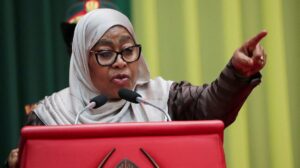Nairobi Governor Johnson Sakaja is finding himself at the center of a heated political struggle that many observers interpret as a direct confrontation with the Kikuyu community, a group that has historically dominated the city’s commercial field.
In recent events, Sakaja has filed an affidavit accusing Deputy President Rigathi Gachagua of unlawfully opposing the relocation of traders from Wakulima Market to Kangundo Road Market a decision made by the Nairobi County government aimed at streamlining operations and reducing congestion in the city.
Wakulima Market, largely populated by Kikuyu traders, has become a focal point in this dispute.
Sakaja’s decision to relocate these traders has been met with significant resistance, particularly from Gachagua, who views the move as an assault on the livelihoods of Kikuyu businesspeople.
By positioning himself against Gachagua, Sakaja is seemingly framing his policies as a necessary step toward modernization and better governance, but it also raises the question of whether he is targeting a specific community’s economic interests for political gain.
According to Sakaja, Gachagua’s intervention in this matter violates the principle of separation of powers, asserting that such decisions fall solely within the jurisdiction of the county government.
This argument may resonate with some Nairobi residents who feel that their city should have autonomy over local affairs without interference from the national government.
However, for many Kikuyu traders, this situation appears as an attack on their established businesses and a signal that Sakaja may not prioritize their economic interests.
In addition to his allegations against Gachagua, Secretary to the Cabinet Mercy Wanjau is set to testify that the Deputy President has also opposed the evacuation of residents living within 30 meters of the Nairobi River, despite a Cabinet decision to proceed with the evacuation.
This clash emphasizes the tension between Gachagua, who is trying to uphold what he believes are the rights of Nairobi residents, and Sakaja, who is aggressively pushing forward with his administrative agenda.
The Kikuyu community has long played a big role in Nairobi’s economy and politics, and any move perceived as undermining their influence risks sparking backlash.
Critics argue that Sakaja’s approach may alienate a vital voter base, particularly as the country heads toward future elections.
The stakes are high for both leaders. Gachagua, armed with a formidable legal team, is preparing to fight these allegations.
His defense hinges on portraying himself as a protector of small businesses and the Kikuyu community, asserting that his actions are grounded in advocacy for ordinary Kenyans.
Sakaja’s public stance could be seen as an attempt to position himself as a reformist leader unafraid to challenge the status quo, even if it means clashing with one of the most influential ethnic communities in Nairobi.
The ongoing conflict between Sakaja and Gachagua underscores the complexities of Nairobi’s politics, where ethnic identities and economic interests often collide.
The implications of his actions could lead to a big shift in the balance of power within Nairobi, particularly concerning the Kikuyu community, which has held considerable economic influence for generations.
This political drama reveals the intricate interplay of governance, ethnicity, and commerce in Nairobi, setting the stage for what could be a transformative period in the city’s history as Sakaja navigates his role against a backdrop of traditional Kikuyu dominance.
The ramifications of this rivalry will undoubtedly resonate throughout the capital and beyond.





















Add Comment